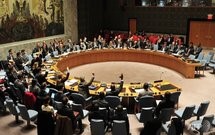 On 27 March, Bangladesh abstained from voting at the UN General Assembly resolution on Russia’s annexation of Crimea. While 100 countries voted in favour of the resolution, 11 opposed it. Bangladesh, alongside 57 others abstained, and eventually worked in Russia’s favour.
On 27 March, Bangladesh abstained from voting at the UN General Assembly resolution on Russia’s annexation of Crimea. While 100 countries voted in favour of the resolution, 11 opposed it. Bangladesh, alongside 57 others abstained, and eventually worked in Russia’s favour.
The ambassador of Russian to Bangladesh welcomed Dhaka’s abstention and thanked the government for the decision. The ambassador of the US expressed regret that Bangladesh failed to show solidarity with the nations that thought Crimea’s decision to join Russia was wrong.
Dhaka claims that Bangladesh abstained because the country did not wish to get involved in the new cold war between Russia and the US because it is a strong believer of the principles of the Non-Aligned Movement.
Critics say it is a wrong move and signaled that Dhaka is turning its back on the Western countries, especially the US, that are major development partners of Bangladesh.
The Prime Minister of Bangladesh, Sheikh Hasina has maintained cordial and cooperative relations with both India and Russia since taking office in 2009. The prime minister visited New Delhi in January 2010, a move that opened new horizons in the India-Bangladesh relations.
During Hasina’s 2013 visit to Moscow she inked the largest arms deal the history of Bangladesh a loan for the construction of the country's first nuclear power plant, cost for which is pitted at $2 billion and which could also be provided by Russia as a loan.
During her first term as the prime minister of Bangladesh (1996-2001) her government procured 10 MiG 21 aircraft from Russia. In 2012, the Hasina government posthumously awarded late Admiral Sergei with a medal in recognition to his contribution to quickly clearing mines from Chittagong port in 1972.
In November 2013, in the first round of voting, Bangladesh supported the Russian city of Ekaterinburg, instead of the United Arab Emirates’ (UAE) city of Dubai for the venue for World Expo 2020. The vote surprised everyone because it was deemed detrimental for Bangladesh-UAE relations, especially with regard to the labour visa issue.
Consequently, many now wonder if Bangladesh’s foreign policy has become Indo-Russia centric.
Given Hasina’s close relations with New Delhi and Moscow, both countries strongly supported her government at a critical time following the non-inclusive and controversial general elections held on 5 January. On 12 January, the Indian prime minister congratulated Hasina on her assuming the office as the prime minister of Bangladesh, and the Russian president followed suit on 14 January.
The Indian and Russian support did not go unnoticed by other countries. Gradually, China, Japan, Australia and other South East Asian nations expressed their eagerness to work with the current government. Even Alan Duncan, the British Minister for International Development, during a visit to Dhaka reportedly stated that the January election was “unusual but legitimate.” Furthermore, Denmark, Germany, and the Netherlands have expressed their interest in constructing the deep sea port at Sonadia in Bangladesh.
The congratulatory messages from India and Russia to the Bangladeshi prime minister, continue to stand in stark contrast to the position of the Western countries, including that of the US and Canada – who have not done so, yet. However, while they have continued to work with the government in areas of trade and aid, occasionally, they urge the incumbent government to hold an inclusive mid-term poll.
On 12 April, the US Ambassador to the country, in a statement issued after a meeting with the Chairperson of the Bangladesh Nationalist Party (BNP), the country’s main political opposition party, reportedly “underscored the ever more urgent need for the parties to engage in serious dialogue immediately to find an agreed way forward to free and fair elections that are credible in the eyes of the Bangladeshi people" .
It seems unlikely that the US and European countries will be able to pressurise the government to hold mid-term elections unless the BNP is able to mount street peaceful movement against the Hasina government.
Moscow, as a global power, continues to have a solid foothold in India and does not want South Asian countries to fall into the increasing influence of the US. Although Moscow and Beijing are strategic partners against the US domination, their interests differ in South Asia. While Moscow looks at India's growing influence in South Asia as a positive, China does not. Additionally, Bangladesh is strategically important for the US, China and India given its geographical dynamics with neighbouring Myanmar – a country where all their interests collide.
Dhaka’s policies towards the US and Russia need to be balanced and foreign policy makers may ensure that the country does not overwhelmingly tilt to one power at the expense of the other. It may be recalled that the Bangabandhu’s dream was to make Bangladesh “a Switzerland of the East,” and policy-makers may not deviate from the ideal cherished by the founder of the nation.
By Special Arrangement with Institute of Peace and Conflict Studies (http://www.ipcs.org)